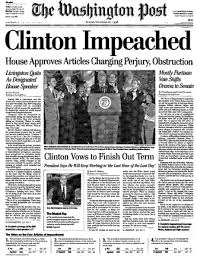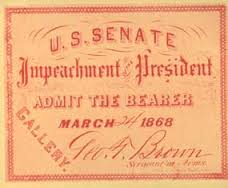 The Constitution‘s Impeachment Clause regarding the president and all civil officers of the United States is in Article II and reads:
The Constitution‘s Impeachment Clause regarding the president and all civil officers of the United States is in Article II and reads:
“The President, Vice President and all civil officers of the United States, shall be removed from office on impeachment for, and conviction of, treason, bribery, or other high crimes and misdemeanors.”
The Constitution’s Article II defines the criteria for removal of the president and other officials of the United States. Article I defines the Congress and its powers. Congress conducts impeachments and Article I defines the process.
Article 1, Section 2, Clause 5–“The House of Representatives . . . shall have the sole power of impeachment.”
Article 1, Section 3, Clause 6–“The Senate shall have the sole power to try all impeachments. When sitting for that purpose, they shall be on oath or affirmation. When the President of the United States is tried, the Chief Justice shall preside: And no person shall be convicted without the concurrence of two thirds of the members present.”
Article 1, Section 3, Clause 7–“Judgment in cases of impeachment shall not extend further than to removal from office, and disqualification to hold and enjoy any office of honor, trust or profit under the United States: but the party convicted shall nevertheless be liable and subject to indictment, trial, judgment and punishment, according to law.”
 Impeachment Applies to All Federal Officers, Not Just Presidents
Impeachment Applies to All Federal Officers, Not Just Presidents
Public discussion of “impeachment” typically involves how application to presidents. Only two presidents have been impeached by the House and neither Andrew Johnson, nor Bill Clinton was removed from office. President Clinton’s impeachment and trial in 1998 is familiar to most. Few are aware that two federal judges have been impeached more recently
The House has begun impeachment proceedings 62 times, and voted Articles of Impeachment 19 times, including once against a Supreme Court Justice. Impeachment was among the “good government” provisions the Framers wrote into the Constitution.
 In 2009 Judge Samuel B. Kent was impeached after being sentenced to 33 months in federal prison for obstruction of justice and lying to investigators who were investigating him for sex crimes. Judge Kent resigned from office before the Senate trial was complete.
In 2009 Judge Samuel B. Kent was impeached after being sentenced to 33 months in federal prison for obstruction of justice and lying to investigators who were investigating him for sex crimes. Judge Kent resigned from office before the Senate trial was complete.
 In 2010, the House impeached and the Senate convicted federal Judge Thomas Porteous . Judge Porteous had lied on financial disclosure forms and concealed income that would have revealed payments from lawyers who had been in his court room. Judge Porteous was not only removed from office, but forever barred from holding any federal office and lost his Louisiana law license.
In 2010, the House impeached and the Senate convicted federal Judge Thomas Porteous . Judge Porteous had lied on financial disclosure forms and concealed income that would have revealed payments from lawyers who had been in his court room. Judge Porteous was not only removed from office, but forever barred from holding any federal office and lost his Louisiana law license.
Impeachment v. Assassination
The 1787 Constitutional Convention in Philadelphia was concerned about a president that should be removed from office. On July 20, 1787, in the course of a lengthy debate regarding possible presidential impeachment, Benjamin Franklin brought history to the convention’s attention in supporting a provision to make the president impeachable.
 “History furnishes one example only of a first Magistrate being formally brought to public Justice.[1] Every body cried out agst this as unconstitutional. What was the practice before this in cases where the chief Magistrate rendered himself obnoxious? Why recourse was had to assassination in wch. he was not only deprived of his life but of the opportunity of vindicating his character. It wd. be the best way therefore to provide in the Constitution for the regular punishment of the Executive when his misconduct should deserve it, and for his honorable acquittal when he should be unjustly accused.”
“History furnishes one example only of a first Magistrate being formally brought to public Justice.[1] Every body cried out agst this as unconstitutional. What was the practice before this in cases where the chief Magistrate rendered himself obnoxious? Why recourse was had to assassination in wch. he was not only deprived of his life but of the opportunity of vindicating his character. It wd. be the best way therefore to provide in the Constitution for the regular punishment of the Executive when his misconduct should deserve it, and for his honorable acquittal when he should be unjustly accused.”
 Franklin recognized that presidents at some point might “render [themselves] obnoxious.” He pointed out the inevitable alternative to impeachment: assassination.[2] Through history, there had been only one sure way to remove a chief executive that had rendered himself obnoxious. In 1787, Julius Caesar was likely the world’s best known assassination victim.[3] Caesar provides an example of how top government leaders were removed from office prior to the United States Constitution.[4]
Franklin recognized that presidents at some point might “render [themselves] obnoxious.” He pointed out the inevitable alternative to impeachment: assassination.[2] Through history, there had been only one sure way to remove a chief executive that had rendered himself obnoxious. In 1787, Julius Caesar was likely the world’s best known assassination victim.[3] Caesar provides an example of how top government leaders were removed from office prior to the United States Constitution.[4]
Constitutional provisions for the impeachment of the head of government were an American contribution to the world. The phrase “American exceptionalism” is properly applied to many of the Constitution’s political innovations. It was novel to the world that a country’s leader could be removed without being killed.
The Impeachment Process
While the Constitution provides the basic of the impeachment process, the House and Senate by virtue of the Rule Making Clause have developed the following procedures:
- The House Judiciary Committee[5] considers the initiation of an impeachment investigation.
- The Judiciary Committee agrees to a resolution to request authority from the whole House of Representatives to begin an investigation. Approval requires a majority vote of the House.
- If the House grants authority then the Judiciary Committee conducts an impeachment inquiry, often with public hearings. Following the inquiry, a committee vote on proposed articles of impeachment takes place. Approval requires a committee majority.
- Approved articles of impeachment are referred to the entire House for consideration. Passage of each article requires a separate House majority. Once an article is approved, the federal official involved is “impeached”. Approved articles are referred to the Senate for trial.
- The House of Representatives appoints impeachment “managers”. These managers act as prosecutors at the impeachment trial, presenting the evidence to the Senate.
- During the trial of a federal official other than the president, the Vice-President is the presiding officer.[6] In the case of the president, the Supreme Court’s Chief Justice presides.
- At the trial’s conclusion, the Senate votes on whether to remove the official from office. Approval of removal requires a two-thirds vote by the Senators present. Should the Senate vote to convict and remove, the official’s termination from office is immediate.
Impeachment and President Trump, Taking Ben Franklin Literally
While ultimately the drafters of the Constitution settled on “treason, bribery, or other high crimes and misdemeanors” as the constitutional basis for impeachment of federal officials, including the president, it was on July 20, 1787 that Ben Franklin openly pondered what was to be done if the chief magistrate (the president) had rendered himself “obnoxious”.
President Trump has frequently been criticized on matters of style whether in his tweets, rallies or the tagging of his opponents with creative nicknames for his opponents. There has been talk of impeachment by critics from before he assumed office and a serial search for an impeachable offense that could plausibly be marketed to America as a high crime or misdemeanor. The country has suffered through this search as his most vehement critics have worked to create the facade of a legal framework to remove him from office. They might consider simply quoting Ben Franklin and admit that it is their belief that President Trump is obnoxious and that was good enough for Franklin, the father of the impeachment clause.
President Trump’s opponents, who began talk of his removal from the day of his election seem to have taken Franklin literally in their hearts and have worked to remove him on grounds of “obnoxious”. In a sense, Franklin’s formulation is correct, as impeachment of a president is a political act cloaked in legal cloth, and if a majority of the House and 2/3 of the Senate think “obnoxious” is enough, it’s enough.
While that may be the technical reality, it’s gut wrenching and destructive for the country for “leaders” to incessantly work at getting a majority of Americans to agree with them that their president is “obnoxious”.
For more, on impeachment see the piece by Hans von Spakovsky: Impeachment: A Preview for What Could Come Next for Donald Trump
[1]Franklin was referring to the trial and death sentence of King Charles I of England. Though Charles had a “trial”, he was ultimately executed. In reality, Charles was assassinated following the pretense of a trial.
[2]For a detailed examination of impeachment as the alternative to assassination see: Impeachment and Assassination.
[3]Thanks primarily to William Shakespeare and his play Julius Caesar. For more on William Shakespeare and some thoughts on his contributions, including style when it comes to beards, see World’s Pre-Eminent Dramatist William Shakespeare and His Beard Style.
[4]English law had provisions for removal of officials below the king.
[5]Impeachment resolutions are typically referred to the Judiciary Committee, but that can vary and in some instances a “select” committee is convened specially for an impeachment investigation. In 1974, the House Judiciary Committee recommended articles of impeachment against Richard Nixon, prompting his resignation.
[6]The Constitution designates the Vice-President as the Senate’s presiding officer.






[…] the 1787 Constitutional Convention that brought us our Constitution, Benjamin Franklin reminded the delegation of the first public magistrate to be brought to justice fo… – Julius Caesar. Caesar was assassinated as a remedy and/or punishment for his transgressions. As […]